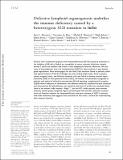| dc.contributor.author | Mooster, Jana L. | en_US |
| dc.contributor.author | Le Bras, Severine | en_US |
| dc.contributor.author | Massaad, Michel J. | en_US |
| dc.contributor.author | Jabara, Haifa | en_US |
| dc.contributor.author | Yoon, Juhan | en_US |
| dc.contributor.author | Galand, Claire | en_US |
| dc.contributor.author | Heesters, Balthasar A. | en_US |
| dc.contributor.author | Burton, Oliver T. | en_US |
| dc.contributor.author | Mattoo, Hamid | en_US |
| dc.contributor.author | Manis, John | en_US |
| dc.contributor.author | Geha, Raif S. | en_US |
| dc.date.accessioned | 2015-09-01T13:28:25Z | |
| dc.date.issued | 2015 | en_US |
| dc.identifier.citation | Mooster, J. L., S. Le Bras, M. J. Massaad, H. Jabara, J. Yoon, C. Galand, B. A. Heesters, et al. 2015. “Defective lymphoid organogenesis underlies the immune deficiency caused by a heterozygous S32I mutation in IκBα.” The Journal of Experimental Medicine 212 (2): 185-202. doi:10.1084/jem.20140979. http://dx.doi.org/10.1084/jem.20140979. | en |
| dc.identifier.issn | 0022-1007 | en |
| dc.identifier.uri | http://nrs.harvard.edu/urn-3:HUL.InstRepos:21462389 | |
| dc.description.abstract | Patients with ectodermal dysplasia with immunodeficiency (ED-ID) caused by mutations in the inhibitor of NF-κB α (IκBα) are susceptible to severe recurrent infections, despite normal T and B cell numbers and intact in vitro lymphocyte function. Moreover, the outcome of hematopoietic stem cell transplantation (HSCT) in these patients is poor despite good engraftment. Mice heterozygous for the IκBα S32I mutation found in patients exhibited typical features of ED-ID. Strikingly, the mice lacked lymph nodes, Peyer’s patches, splenic marginal zones, and follicular dendritic cells and failed to develop contact hypersensitivity (CHS) or form germinal centers (GCs), all features not previously recognized in patients and typical of defective noncanonical NF-κB signaling. Lymphotoxin β receptor (LTβR)–driven induction of chemokines and adhesion molecules mediated by both canonical and noncanonical NF-κB pathways was impaired, and levels of p100 were markedly diminished in the mutant. IκBα mutant→Rag2−/−, but not WT→IκBα mutant, bone marrow chimeras formed proper lymphoid organs and developed CHS and GCs. Defective architectural cell function explains the immunodeficiency and poor outcome of HSCT in patients with IκBα deficiency and suggests that correction of this niche is critical for reconstituting their immune function. | en |
| dc.language.iso | en_US | en |
| dc.publisher | The Rockefeller University Press | en |
| dc.relation.isversionof | doi:10.1084/jem.20140979 | en |
| dc.relation.hasversion | http://www.ncbi.nlm.nih.gov/pmc/articles/PMC4322042/pdf/ | en |
| dash.license | LAA | en_US |
| dc.title | Defective lymphoid organogenesis underlies the immune deficiency caused by a heterozygous S32I mutation in IκBα | en |
| dc.type | Journal Article | en_US |
| dc.description.version | Version of Record | en |
| dc.relation.journal | The Journal of Experimental Medicine | en |
| dash.depositing.author | Massaad, Michel J. | en_US |
| dc.date.available | 2015-09-01T13:28:25Z | |
| dc.identifier.doi | 10.1084/jem.20140979 | * |
| dash.authorsordered | false | |
| dash.contributor.affiliated | Burton, Oliver T. | |
| dash.contributor.affiliated | Galand, Claire | |
| dash.contributor.affiliated | Massaad, Michel | |
| dash.contributor.affiliated | Geha, Raif | |
| dash.contributor.affiliated | Manis, John | |


